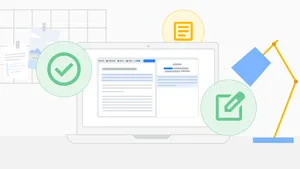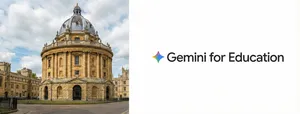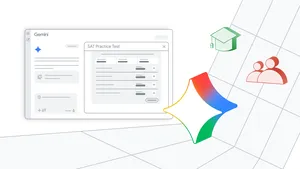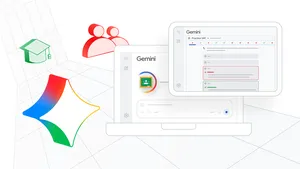“A whole new world” of ideas at the Technovation Challenge

“Programming opens new horizons. It gives me full space to [create things] I couldn’t even imagine.” These are the words of Diana Zhanakbayeva, a young woman from Kazakhstan who, along with three classmates, just took home the top prize at an international coding challenge.
Great ideas can come from anywhere and from anyone. That’s what’s behind the 2017 Technovation Challenge, run by nonprofit Iridescent, announced last fall in partnership with Google’s Made with Code and UN Women to offer young women from around the world the chance to code an app that solves a real-world challenge. More than 11,000 girls from 103 countries formed teams to address issues in those categories: peace, poverty, environment, equality, education, and health. This week, the finalists traveled to Google’s headquarters in Mountain View to pitch their ideas to a panel of tech leaders and other experts. And tonight, in front of 900+ supporters, educators, mentors and past participants, the four girls behind a safety app called QamCare were crowned the winner of the Senior Division.

To girls around the world who participated in the Challenge, or who are considering a career in computer science, or any field: we believe you should be encouraged and empowered to become the coders, entrepreneurs and inventors that shape the world around you. We will never stop working to create an industry and environment in which women feel welcome and can thrive.
Meet the girls behind QamCare, and the other finalist teams:
QamCare (Peace)
Aruzhan Koshkarova, Azhar Sultansikh, Dianna Zhanakbayeva, Diyara Beisenbekova
“QamCare” comes from the Kazakh word-Qamqor, which stands for care and support. The team behind this winning app describes it as a “potential life-saving tool,” which can be used in case of emergency to provide your location information to your contacts. With the press of a button, you can alert trusted friends and family via SMS. Azhar Sultansikh says the app is designed to give people “peace of mind.”

QamCare’s creators describe a number of other hobbies and interests beyond CS: Diana Zhanakbayeva has dabbled in fashion and creating YouTube videos; Aruzhan Koshkarova says she used the cognitive skills learned from playing chess to work in programming; Azhar’s first loyalty is to art; and Diyara Beisenbekova is interested in medicine and chemistry. But all share a motivation to keep learning—and making a difference. Aruzhan says that the team was inspired to participate in the Challenge to “make change in [her] community” and for “women’s empowerment”—hoping to blaze the trail for more young Kazakh women to participate in science and tech.
One Step Ahead (Education)
Aghavni Hakobyan, Sona Avetisyan, Svetlana Davtyan, Violeta Mkrtchyan, Vardanush Nazaretyan
When a deaf classmate visited their school, this team of five girls from Karbi, Armenia, came up with the idea for an app to help people learn Armenian Sign Language using videos of sign gestures. The One Step Ahead team demonstrates how experiences like Technovation can inspire young people to pursue a wide variety of career paths. While Aghavni Hakobyan, 17, says that the program inspired her to want to become a programmer, her teammate Sona Avetisyan, 16, wants to become a doctor to “help with hearing loss problems and help people communicate.”
PregCare (Health)
Aamanat Kang, Anoushka Bhalla, Mehak Joshi, Priyaja Bakshi, Vanshika Baijal
The PregCare team, in India, created an app that provides pregnant women, especially those in rural areas, with healthcare information, even offering alerts for appointments; it also connects women with donors and other organizations. Aamanat Kang says of the challenge, “The interesting part of technology is its ability to change and evolve in the blink of an eye. What keeps me hooked on to computers is that we do not know what to expect in the world of technology tomorrow or 10 years from now.“
Go WaCo (Environment)
Aida Khamiyeva Ardakkyzy, Arlana Yessenbayeva, Askar Zhibek Askarkyzy, Diana Zhanakbayeva
In Almaty, Kazakhstan, a city of more than 1.5 million people, only 2 percent of waste is recycled, with the remaining 98 percent going to landfills. The four girls behind Go WaCo (short for “Go, Waste Conscious”) wanted to come up with a way to encourage people to recycle, so they created an app that challenges students from different schools to participate in recycling competitions and compete for rewards. Arlana Yessenbayeva, 16, says of the project: “Go WaCo is my first big step in changing this world for the better. In the future I want to connect people, inspire them to invent, share, and solve the world's problems.”
iCut (Equality)
Ivy Akinyi, Macrine Akinyi, Purity Achieng, Stacy Dina Owino, Cynthia Awuor
Female genital mutilation (FGM) has been banned in Kenya since 2011, but in many areas of the country it continues to be practiced. The iCut app is designed to provide a platform for people to report cases of FGM, as well as for victims to seek help. Several of the girls behind iCut described how coding helped them discover new kinds of potential: Stacy Dina, 17, says “When my mentor ... introduced programming to us, I was elated. [I] felt empowered.“ Synthia Awuor, 17, adds: “Joining [Technovation] opened my eyes to a whole new world.”
Wishcraft (Poverty)
Jigisha Kamal, Krithika Sunil, Rida Shafeek
Our second team from India designed an Android app that lets donors fulfill “wishes” for underserved children. Nonprofits or charitable trusts who work on children’s issues can upload three wishes for each child, which donors can select from to provide the amount quoted for each gift. The idea is to “bring a little joy into [children’s] everyday lives through donations in the form of gifts,” as Jigisha Kamal puts it. Rida Shafeek, 17, says of their app, “It was a chance to make a change… to provide opportunities to underprivileged kids to embrace every bit of their childhood and to provide a door to a better future.”
The projects we saw this week demonstrate that code is a potent tool to create change—and show that there is a generation of young people eager to wield it. We’re inspired by the energy and enthusiasm we saw at the Technovation Challenge—and excited to continue to help more future leaders make a difference through technology.







